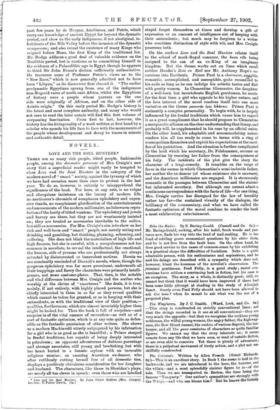NOVELS.
LOVE AND THE SOUL HUNTERS.*
THREE are so many rich people, titled people, fashionable people, among the dramatis personae of Mrs. Craigie's new story that a superficial reader might easily be tempted to class Love and the Soul Hunters in the category of the modern novel of " smart " society, against the tyranny of which we have had occasion more than once to protest in the last year. To do so, however, is entirely to misapprehend the significance of the book. For here, at any rate, is no vulgar and obsequious insistence on the luxury of modern life, no auctioneer's chronicle of sumptuous upholstery and expen,- sive viands, no complaisant glorification of the entertainments and amusements of the modern millionaire, no lukewarm repro- bation of the laxity of titled wantons. The upholstery and jewels and luxury are there, but they are not wearisomely insisted on ; they are treated as accessories inevitable to the milieu, but still as accessories. For Mils. Craigie's aim is to show us her rich and well-born and " smart " people, not merely eating and drinking and gambling, but thinking, planning, scheming, and suffering. She does not blink the materialism of high life and high finance, but she is careful, with a scrupulousness not too 'common in novelists, to rev sal the intellectual, the emotional, the human, side of persons who are professionally not always actuated by disinterested or benevolent motives. Herein we are constantly reminded of Disraeli's novels, where, though the gorgeous-upholstery was far more prominent, underneath all their trappings and finery the characters were primarily intelli- gences, not mere costume-plates. That, then, is the notable and vital difference between Mrs. Craigie and the scribes who worship at the shrine of " smartness." She deals, it is true, mainly, if not entirely, with highly placed persons, but she is chiefly interested in them in so far as they reveal qualities which cannot be taken for granted, or as in keeping with their antecedents, or with the traditional view of their position,— qualities, furthermore, which are almost invariably higher than might be looked for. Thus the book is full of surprises—and surprise is of the vital essence of recreation—as well as of a sort of fantastic optimism, which is at any rate quite as defen- sible as the fantastic pessimism of other writers. She shows us a modern Machiavelli utterly subjugated by his infatuation for a girl who is as good as she is beautiful ; a Prince steeped in feudal traditions, but capable of being deeply interested in petroleum ; an apparent adventuress of dubious parentage and strange associates, still young and bewitching, but with her heart buried in a lunatic asylum with an incurable religious maniac ; an amazing American ex-dancer, who after ruthlessly cutting herself free of all domestic ties, displays a positively chivalrous consideration for her daughter and husband. The characters, like those in Sheridan's plays, are nearly all too clever in speech ; even those who are labelled • Lore and the Soul Hunters. By John Oliver Hobbes (hiss. Craigie). Lo:. Ion : T. Fisher Unvrin. [6e.] stupid forget themselves ,at times and develop a gift of expression or an amount of intelligence out of keeping with their antecedents ; but much may be forgiven to a writer who combines distinction of style with wit, and Mrs. Craigie possesses both.
On the surface Love and the Soul Hunters relates itself to the school of mock-Royal romance, the beau role being assigned to the son of an ex-King of an imaginary kingdom. But the theme works out on lines which recall neither Daudet's Bois en Exit nor Mr. Anthony Hope's ex. cursions into Ruritania. Prince Paul is a charmeur, amiable, romantic, accomplished, and susceptible, quite reconelled to his exile so long as he can indulge his artistic tastes and flirt with pretty women. In Clementine Gloucester, the daughter of a well-born but invertebrate English gentleman, he meets for the first time a girl who appeals to his higher nature, and the love interest of the novel resolves itself into one more variation on the theme potmaxii, ipas aidciOMEI. Prince Paul is eminently a complex personality. To begin with, he is largely influenced by the feudal traditions which cause him to regard it as a great compliment that he should propose to Clementine a morganatic alliance on the clear understanding that it may, and probably will, be supplemented in his case by an official union. On the other hand, his adaptable and accommodating nature renders him all too ready to come to terms with a ring of cosmopolitan financiers and exploit his expectations at the sacri- fice of his patriotism. And the situation is further complicated by the hold which his secretary, Dr. Felshammer, secures on Clementine by rescuing her father from the consequences of his folly. The incidents of the plot give the story the character of a tragi-comedy. It trembles on the verge of farce in the scenes in which Clementine's semi-imbecile father, her mother the ex-dancer (of whose existence she is unaware), and the American millionaire are engaged. It is strenuously romantic in the passages between Clementine and the sinister but infatuated secretary. But although one cannot admit a continuous correspondence with the facts of life—for one thing, Mrs. Craigie carries her disregard for the law of heredity rather too far—the sustained vivacity of the dialogue, the brilliancy of the commentary, and what we have called the fantastic optimism of the moral combine to render the book a most exhilarating entertainment.










































 Previous page
Previous page